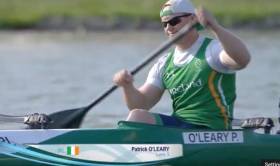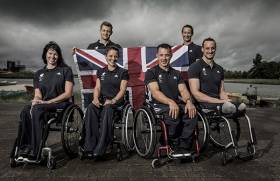Displaying items by tag: ParaCanoeing
#Canoeing: Patrick O’Leary realised his dream of qualifying his boat for his second successive Paralympic Games today. The Ireland canoeist finished fifth in the A Final of the VL3 200 metres at the canoe sprint World Championships in Szeged, Hungary. Curtis McGrath of Australia took the gold. O’Leary, who had won his semi-final, was in fourth or fifth right through a race in which six boats qualified for Tokyo.
Barry Watkins missed out on a chance of qualifying for the Olympic Games in the K1 500. The Irishman took sixth in his semi-final and will compete in a B Final.
Canoe Sprint World Championships, Szeged, Hungary (Irish interest)
Men
K1 500 Semi-Final Three: 6 Ireland (B Watkins) 1:40.38.
Paracanoeing – Men’s VL3 200m A Final (Top six nations qualify for Paralympic Games): 1 Australia (C McGrath) 47.42 seconds; 5 Ireland (P O’Leary) 49.27.
The British Paralympic Association (BPA) today announced the six athletes selected to represent ParalympicsGB at Rio 2016 in the sport of Paracanoe, set to feature on the Paralympic programme for the very first time this September.
The team announced were: Jeanette Chippington, Robert Oliver, Emma Wiggs, Ian Marsden, Anne Dickens and Nick Beighton.
Canoeing Ireland Sets Off On Road To Rio Paralympics
#Canoeing - With para-canoeing set to join the list of sports at the Rio Paralympics in 2016, Canoeing Ireland says it is keen to develop the sport and identify and support athletes with hopes of representing Ireland.
That was the message from Canoeing Ireland's Olympic Sprint chairman Eamon Fleming, who was on hand to thank Paralympics Ireland for accepting Canoeing Ireland into the Paralympics family at an event last week.
"We are very excited to be a part of the Paralympics family and see great potential in growing para-canoeing in the future," he said.
According to Fleming, he and Ireland's canoe sports governing body "were inspired to see para-canoeist Patrick O'Leary finished second in the men's 200m event in very tough conditions" at the first sprint regatta of the year in Nottingham last weekend.
Also now paddling his own canoe for Rio is two-time rowing Paralympian Kevin Du Toit, who is currently training out of Richmond Canoe Club in London – a home away from home for Irish paddlers over the years.
Karl Dunne, CEO of Canoeing Ireland, said: "We are delighted to have had instant success with Patrick's result in Nottingham, He will now compete at the European Championships in Portugal this summer.
"Canoeing Ireland look forward to working with Liam and his team on the road to Rio."


























































